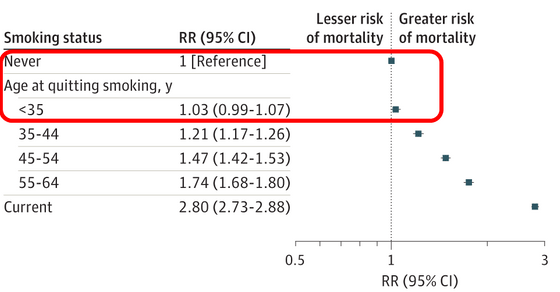If you stop smoking by the age of 35, the ``death risk'' will be the same as those who have never smoked

Since smoking affects various
Association Between Smoking, Smoking Cessation, and Mortality by Race, Ethnicity, and Sex Among US Adults | Health Disparities | JAMA Network Open | JAMA Network
http://dx.doi.org/10.1001/jamanetworkopen.2022.31480
Quitting Smoking by Age 35 Years—A Goal for Reducing Mortality | Health Disparities | JAMA Network Open | JAMA Network
https://jamanetwork.com/journals/jamanetworkopen/fullarticle/2797599
Quitting smoking by age 35 brings your risk of death in line with 'never smokers' |
https://www.livescience.com/quitting-smoking-by-35-lowers-mortality-risk
Although there is a great deal of research on smoking and health, research data looking at the effects of different demographic groups, such as age groups, are limited. Therefore, a research team led by Blake Thomson of the American Cancer Society conducted a study to analyze data from the US National Health Interview Survey and the National Death Index.
The subjects of the analysis were 551,388 people who cooperated with the questionnaire between January 1997 and December 2018, aged 25 to 84 at the time of recruitment, with an average age of 48.9, and 74,870 during the period. A person died for some reason. Data on smoking habits were also collected in the survey, and those who had smoked less than 100 cigarettes were classified as nonsmokers, and those with more than 100 cigarettes as smokers. In addition, 54% of those who have ever smoked had already quit smoking at the time of the survey, and the average smoking cessation age was 38 years old.
Combining the data collected with death records, the researchers found that people who stopped smoking before age 35 had a significantly lower risk of death than those who continued to smoke after that. Below is a table and graph demonstrating that. If the risk of death among nonsmokers who had never smoked at all was set at 1, the mortality rate among those who quit before age 35 was 1.03, a difference of only 3%, if not exactly the same. .

On the other hand, the effect of smoking cessation diminished as the period until quitting increased. Specifically, ex-smokers who quit between the ages of 35 and 44 had a 21% higher mortality rate than never-smokers, 47% among those aged 45-54, and 74% among those aged 55-64. The risk of death increased by 180%, or nearly tripled, for those who never quit.
Based on the results, the research team concluded that `` continued smoking regardless of race, ethnicity, or gender was associated with at least twice the all-cause mortality rate compared to not smoking at all. was associated with a significant reduction in relative excess mortality attributable to continued smoking.'
Professor John P. Pearce of the University of California, San Diego, who was not directly involved in the study, said in a commentary on the paper that the results of this study could help to significantly increase the motivation of young people to try to quit smoking. said. Younger smokers are more likely than older people to try to quit, but the success rate is much lower, Pierce said. Professor Pierce points out that this is probably because young people are less likely to realize the health hazards of smoking, so they think, ``There is no need to quit right now.''
However, this study indicated the age of '35 years old' as a time limit to reduce the risk of death from tobacco to almost the same as nonsmokers. Professor Pierce said, ``Medical professionals and public health campaigns could adopt this target age of 35 in their efforts to persuade young smokers to quit, because they don't want to quit. This is because a target age, which is critical to success, is close at hand, and the closer you get to that age, the more motivated you may be to quit smoking. We have succeeded in increasing it,' he commented.
Related Posts:
in Science, Posted by log1l_ks







